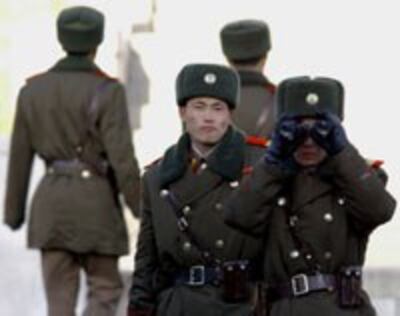
WASHINGTON—A sudden change in rhetoric from North Korea has boosted hopes of progress in six-nation talks over Pyongyang's nuclear weapons program, though analysts say a quick resolution of the issue remains unlikely.
In a report carried on the official KCNA newswire, North Korea said its officials had engaged in a "candid and in-depth exchange of views" with the visiting delegation of U.S. legislators led by Curt Weldon, vice chairman of the House of Representatives' Armed Services Committee.
"At the meetings, the DPRK side reaffirmed its will to settle the nuclear issue peacefully through dialogue and negotiations and explained why it has decided to resume the six-way talks," KCNA said in a report released as Weldon's delegation left North Korea—which refers to itself as the DPRK—Jan. 14.
"Instead of repeating the unpleasant past, the DPRK side expressed its stand that the DPRK would not stand against the U.S. but respect and treat it as a friend unless the latter slanders the former's system and interferes in its internal affairs," it said.
U.S. officials to wait and see
The United States was cautious about the offer to resume talks with China, North and South Korea, Japan, and Russia, stalled since a third round in June 2004.
Pyongyang refused to attend a fourth round scheduled for September, accusing Washington of hostile policies towards it.
It's a big change from the language that the North Koreans have been using against the Americans recently.
"It's a big change from the language that the North Koreans have been using against the Americans recently," Aidan Foster-Carter, Honorary Senior Research Fellow in Sociology and Modern Korea at Leeds University, told RFA. "It does sound like what the North Koreans themselves would call a bold switch-over."
But the apparent olive branch has met with a muted reaction in Washington, with U.S. officials saying they will wait and see what North Korea actually does.
Michael O’Hanlon of the Washington-based Brookings Institution said he doubted North Korea was in good faith.
Hawks vs. doves
"My guess is that we will see no immediate resolution of the nuclear problem," O'Hanlon told RFA's Korean service. He also advised the Bush administration to link any nuclear agreement to improvements in human rights.
"While you never turn down a nuclear deal just because it fails to include human rights, we are not likely to get a nuclear deal without seeing a broader change in the North Korean mentality," he said.
We are not likely to get a nuclear deal without seeing a broader change in the North Korean mentality.
Meanwhile, the Bush administration might not tone down its rhetoric against the isolated Stalinist state, Foster-Carter said.
"I just don't know if the United States can deliver that," he said, contrasting the role of Weldon, a pro-engagement Republican, with Pyongyang's dislike of John Bolton, U.S. undersecretary for arms control and international security. "It obviously helps that Weldon is not the main slanderer, but one never knows how far it will go."
The nuclear standoff began in October 2002 when the United States accused North Korea of operating a nuclear weapons program based on enriched uranium, in violation of a 1994 agreement.
Pyongyang has denied running the uranium-based program but has admitted restarting its plutonium program, citing fears of a pre-emptive strike by the United States.
